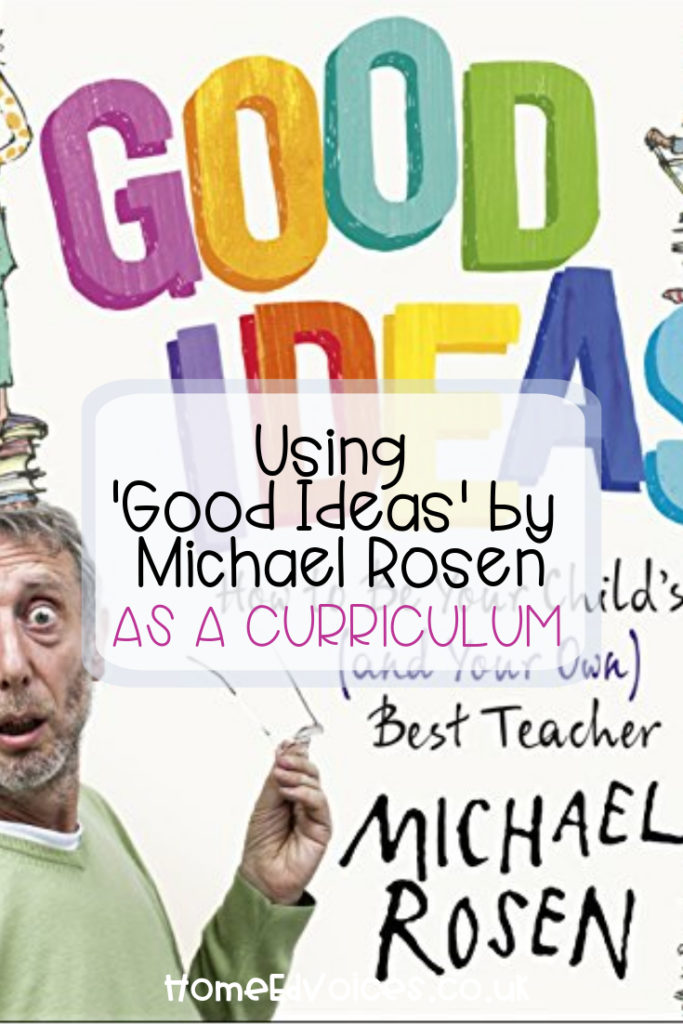Using ‘Good Ideas’ by Michael Rosen as a Curriculum
This blog post does not contain affiliate links because we think you should borrow books from your library if you can, or get them second hand or from where ever you personally want to buy books. Not just amazon because it might make us some money. You can read more about our affiliate policy here.

Often what we home educators need is someone to remind us why we are doing this in the first place. Good Ideas does just that.
In 2014, former children’s laureate Michael Rosen published a book called Good Ideas, about how parents could explore the world around them alongside their children. I don’t think he ever intended for it to be of specific use to home educators, it’s a book for all parents after all. But as both an exploration of family relationships, and inspiration about all the interesting things around us, (if we would only notice them), it’s a book that home educators can return to again and again, for gentle support and a wealth of ideas.
Having been written by a prolific and respected British writer, and having been out a few years now, it’s super available – your library almost definitely has copies of it, I’ve seen it turn up in charity shops and second hand book shops, there are cheap copies in amazon marketplace and on ebay, the kindle edition is £3.99, and it often turns up in audible sales. And since it is written by a British person living in the UK, it doesn’t need parsing through a ‘this is American-centric but we have something similar here too that might work, kinda’ filter, that you get with many homeschooling books.
The book is split into groups of chapters about different areas of life. First there is a detailed section on the how of the book called ‘Ways and Means’ which covers ideas about conversation, learning, clubs and activities, and how to help with homework when you don’t know much about it. (Which is basically about learning things alongside your children, which is crucial to home education imho.)
Directly after that the rest of the book is about ‘Where good ideas come from’ – the where of the book – which are spit into the groups of chapters under the headings of The Home, Outdoors, The Street, Travelling and Holidays, and Days Out, Outings and Visits. The final section is ‘Food for Thought’ includes writing ideas, supplies, thought puzzles to play with, and a book list.
(Addendum for life in a country battling coronavirus – the section on the home would be great for digging through as we practise social distancing. In fact the book is full of fun ideas for family unity, and fun.)
The book is full of stories about Rosen’s life, told in such a way to encourage you to think of the stories of your own life, and how those stories and family experiences become part of your families own mythology, and language. Rosen is endlessly curious, continuously asking why about things that many people take of granted. He takes you on a tour of the world directly around you and then asks you about it, why is it like that? How does it work? Where does it go? Reminding you that you are surrounded by questions, as long as you remember to ask them.
This curiosity, and desire to explore alongside his children, gets to the heart of why so many of us home educate, something that can easily get lost amongst maths curricula and juggling all our different roles has home educators.
So how could you use Good Ideas as a curriculum?
- don’t try to read and implement the book in one go. That would be incredibly overwhelming, which would miss the point, and would be like trying to pour an entire buffet down your throat.
- pick a chapter that looks like a good fit and dig in to some of the ideas (seriously you could open the book at random and go from there)
- Personally I like highlighting the questions, and then talking to my kids about a couple of them, and trying to find out answers to them
- make a space on a wall for questions, and encourage family members to post questions they want to know the answers to there (post it notes or paper and Bluetack are great.)
- write down questions that you are asked – especially if you don’t have the time to answer the question right there and then – and post them on the question wall.
- pick up the book when you’re feeling like a bad Home Educator. We all feel that way sometimes. Be reminded that:
- children learn so much from experiencing the world;
- the greatest part of learning as a child isn’t part of exams and can’t be learned as a course;
- children will live in a world of people. There isn’t an ‘A’ Level for that.
Good Ideas is a great book for all parents, but for British home educators, it’s a book that can remind us that, at it’s heart, our education can be based on family and ‘wonder.’